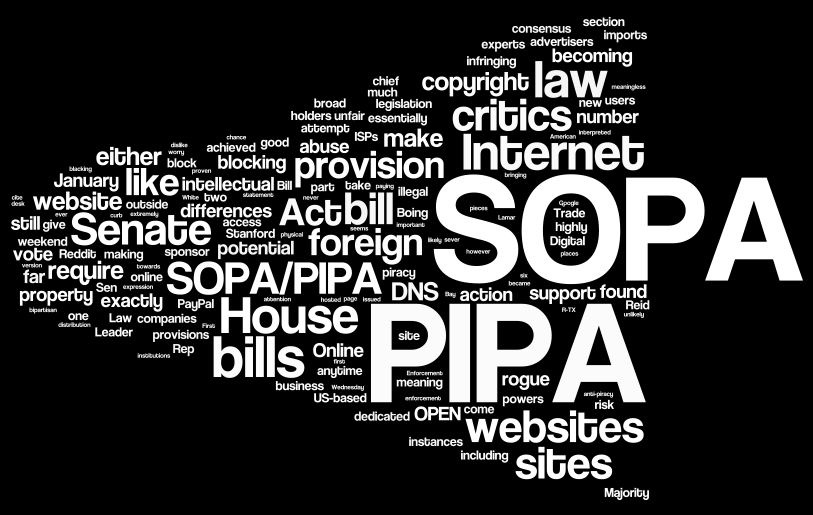There have been many arguments against SOPA (Stop Online Piracy Act) and PIPA (PROTECT IP Act), based on the fact that they will negatively impact innovation across the Internet.
What the heck is SOPA/PIPA?
To put it simply, here’s what SOPA and PIPA intend “to minimize the dissemination of copyrighted material online by targeting sites that promote and enable the sharing of copyright-protected material, like The Pirate Bay.”
SOPA gives both the U.S. government and copyright holders the authority to seek court orders against websites associated with infringing, pirating and/or counterfeiting intellectual property.
Under PIPA, if a website is accused of containing copyright-infringing content (like a music, video clip etc.), the site could be blocked by the Internet service providers, de-indexed from search engines, and even prevented from doing business online with services like PayPal.

So why is that of great concern?
The reason why most major Internet companies oppose to the act is simple. SOPA and PIPA change the liability rules around copyright infringement. These acts, while perhaps well-intentioned, are not well-written and could cause serious damage to the free flow of information on the Internet.
Basically the bill allows big media to have sites shutdown if they disagree with what has been published or say that the media is copyrighted.
Fortunately, the highly debated proposed piece of legislation PIPA has been postponed. The Senate has delayed to vote, admitting that Congress may need to rethink its approach to thwarting piracy.
There is great concern and consternation on the exact repercussions of such a bill on business owner. Question is, how may this harm small and medium sized business and affect SEO?
SEOers already hate you!
Here’s how:
1. When you generate content, You might have to verify every single source that you link to and MAKE SURE that they’re not also violating SOPA in some way. This goes for articles, videos, images and any type of online content.
2. You might have to verify every single source that you link to and MAKE SURE that they’re not also violating SOPA in some way. This will be a complete waste of resources each time you post content. This in turn would decrease interlinking between sites and affect SEO.
3. Google indexing might become more difficult as Google would also need to adjust to the new rules and regulations. They would have to verify all the sites they’re indexing and that NONE of them violate any copyright laws. This would mean that the Sandbox would come back and Google would take a much longer time to index new sites and pages.
4. New backlinking methods might emerge such as “no-follow” or “no-right”. The industry would adapt to SOPA by protecting themselves by linking to sources with more caution. It would mean that interlinking will happen but with specific codes such as “no-right-follow” which might mean that the linked website’s information has not been verified.
(Source: http://www.optimum7.com/)
Of course, you might already know we do not support SOPA/PIPA. Even if SOPA is essentially dead, the US government do seem willing to stopping piracy one way or another. With Megaupload, and Anonymous involved now the question is, what’s the next step?



10 Comments
I’m now not sure the place you are getting your information, however great topic.
I needs to spend a while studying more or understanding more.
Thank you for magnificent information I used to be
searching for this information for my mission.
certainly like your web-site but you have to check the spelling on several of your posts.
Several of them are rife with spelling issues and I in finding it very troublesome to inform the truth then again I’ll
definitely come again again.
https://tinyurl.com/4cnskcbe https://cutt.ly/nHvvycb http://glowackiubezpieczenia.pl https://tinyurl.com/zpnnuu5k https://rebrand.ly/8b2ea1 https://is.gd/rC2GTf http://roszczenia-ubezpieczeniowe.pl http://ubezpieczenia-on-line.pl https://rebrand.ly/4a8744 http://ubezpieczenialekarskie.pl
https://bit.ly/3LmWxGq https://tinyurl.com/bdwazpa2 https://tinyurl.com/2yxx4dww https://is.gd/mIJPB2 https://cutt.ly/1Hvc6EC https://bit.ly/3yFXjMa https://is.gd/JECJVc https://rebrand.ly/171c98 https://bit.ly/39Slb4E http://glowackiubezpieczenia.pl
https://Bit.ly/ https://cutt.ly/lHvcAMd
cutt.ly https://is.gd/ bit.ly rebrand.ly
tinyurl.com ubezpieczenia-warszawa.com.pl
http://ubezpieczeniacompensa.pl https://rebrand.ly/0004e5 cutt.ly ubezpieczsieznami.pl
rebrand.ly tinyurl.com bit.ly allianz-ubezpieczenia.pl
Sutter Health
Hello friends, pleasant post and nice urging commented at this place, I am genuinely enjoying by these.
it’s awesome article. I look forward to the continuation.
very satisfying in terms of information thank you very much.
I like the efforts you have put in this regards for all the great content.
I just like the helpful information you provide in your articles
You actually expressed that wonderfully.
My homepage :: https://lifeblossv.blogspot.com